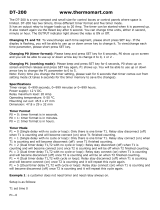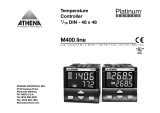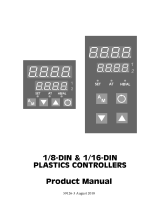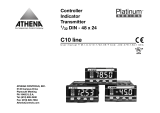Page is loading ...

Double action controller
with analogue output
1/4DIN - 96 x 96
Q3 line cc
User Manual • 03/ 11 • Code: ISTR_M_Q3_E_03_--
UL
CUS
LISTED
ISO 9001
Certified
Ascon Tecnologic srl
viale Indipendenza 56, 27029 Vigevano (PV)
Tel.: +39-0381 69 871 - Fax: +39-0381 69 8730
Sito internet: www.ascontecnologic.com
Indirizzo E-Mail: [email protected]

Double action controller
with analogue output
1/4DIN - 96 x 96
Q3 line cc
Q3
I1 I2 I3 123 MAN
SP
PV
HLD
AT
S2
S1
REM
45.80
45.80
SCI
RUN
UL
CUS
LISTED

2
Information
cc
NOTES
ON ELECTRIC
SAFETY AND
ELECTROMAGNETIC
COMPATIBILITY
Please, read carefully these instructions before proceeding with the installation of the controller.
Class II instrument, for indoor use only.
This controller has been designed with compliance to:
Regulations on electrical apparatus (appliance, systems and installations) according to
the European Community directive 73/23/EEC amended by the European Comunity direc-
tive 93/68/EEC and the Regulations on the essential protection requirements in electrical
apparatus EN61010-1 : 93 + A2 : 95.
Regulations on Electromagnetic Compatibility according to the European Community
directive n° 89/336/EEC, amended by the European Community directive n° 92/31/EEC,
93/68/EEC, 98/13/EEC
and the following regulations:
- Regulations on RF emissions:
EN61000-6-3: 2001 residential environments
EN61000-6-4: 2001 industrial environments
- Regulation on RF immunity:
EN61000-6-2: 2001 industrial equipment and system
It is important to understand that it’s responsibility of the installer to ensure the compliance
of the regulations on safety requirements and EMC.
Repairs: this device has no user serviceable parts and requires special equipment and spe-
cialised engineers. Therefore, a repair can be hardly carried on directly by the user. For this
purpose, the manufacturer provides technical assistance and the repair service for its Customers.
Please, contact your nearest Agent for further information.
All the information and warnings about safety and electromagnetic compatibility are
marked with the Bsign, at the side of the note.

3
Table of contents
TABLE OF CONTENTS
1INSTALLATION ...................................................Page 4
2ELECTRICAL CONNECTIONS .............Page 8
3PRODUCT CODING ......................................Page 18
4OPERATIONS......................................................Page 23
5DISPLAYS...............................................................Page 49
6COMMANDS........................................................Page 50
7SETPOINT PROGRAMMER....................Page 55
8TECHNICAL SPECIFICATIONS ...........Page 61
Main universal input
Control Alarms
Retransmission
Resources
PV
AUX
IL1
IL2
IL3
Modbus RS485
Parameterisation
Supervision
(option)
Q3
Setpoint Fuzzy tuning with automatic selection
One shot
Auto tuning
One shot
Natural Frequency
Operating mode
12
12
Auxiliary input
Digital
input
Special functions (option)
Digital inputs (IL1,IL2 or IL3) functions
PV / SP
1 OP1 OP2 OP3 OP5
2Single OP4 OP1 OP2 OP3 OP5
action
3 OP5 OP1 OP2 OP3
4 OP1 OP2 OP3 OP5
5 OP1 OP4 OP2 OP3 OP5
6Double OP4 OP2 OP1 OP3 OP5
action
7 OP1 OP5 OP2 OP3
8 OP5 OP2 OP1 OP3
11 Valve OP1 OP2 OP3 OP5
(Option)
9 OP4 OP5 OP1 OP2 OP3
10 OP5 OP4 OP1 OP2 OP3
OP1
OP2
OP3
OP4
OP5
(option)
(Option)

4
1 - Installation
1INSTALLATION
Installation must only be carried out by
qualified personnel.
Before proceeding with the installation of
this controller, follow the instructions illus-
trated in this manual and, particularly the
installation precautions marked with the
Bsymbol, related to the European
Community directive on electrical protection
and electromagnetic compatibility.
B
To prevent hands or metal touching parts
that may be electrically live, the controllers
must be installed in an enclosure and/or
in a cubicle.
IP 20 Terminal Block
EN61010 - 1 (IEC1010 - 1)
Product code label
Sealing front panel gasket
Mounting clamps
Front panel
IP65 protection
EN 650529 (IEC 529)
Panel
surface
1.1 GENERAL DESCRIPTION

5
1 - Installation
1.2 DIMENSIONAL DETAILS 1.3 PANEL CUT-OUT
96 mm
3.78 in
110 mm
4.33 in
10 mm max.
0.39 in max.
10 mm max.
0.39 in max.
96 mm
3.78 in
92+0.8 mm
3.62+0.031 in
113 mm min
4.45 in min
92+0.8 mm
3.62+0.031 in
103 mm min
4.05 in min

6
1 - Installation
Operating conditions
MAltitude up to 2,000 m
TTemperature 0…50°C
%Rh Relative humidity 5…95 % non-condensing
1.4 ENVIRONMENTAL CONDITIONS B
Special conditions
MAltitude > 2,000 m
TTemperature >50°C
%Rh Humidity > 95 %
PConducting atmosphere Use filter
Warm up
Use forced air ventilation
Use 24V~supply version
Suggestions
Forbidden Conditions D
CCorrosive atmosphere
EExplosive atmosphere

7
1 - Installation
1.5.1 INSERT
THE INSTRUMENT
1Prepare panel cut-out;
2Check-front panel gasket
position;
3Insert the instrument through
the cut-out.
1.5.2 INSTALLATION
SECURING
1Fit the mounting clamps;
2Push the mounting clamps
towards the panel surface to
secure the instrument.
1
3
2
1.5.3 CLAMPS
REMOVING
1Insert the screwdriver in the
clips of the clamps;
2Rotate the screwdriver.
2
1
1.5.4 INSTRUMENT
UNPLUGGING B
1Push, and
2Pull to remove the instrument,
Electrostatic discharges can
damage the instrument
Before removing the instrument
the operator must discharge
himself to ground.
1MΩ
12
1
2
1.5 PANEL MOUNTING [1]
2
1
1
UL note
[1] For Use on a Flat Surface of a Type 2
and Type 3 ‘raintight’ Enclosure.

6
5
4
3
2
1
28
27
30
29
26
25
719 31
820 32
933
10 34
11 23 35
12 24 36
0,5
Nm
5.7 mm
0.22 in
Rear terminal
cover
Cable size
1 mm2
(18 AWG)
8
2 - Electrical connections
2ELECTRICAL
CONNECTIONS
28 screw terminals M3
Option terminals
Holding screw 0.5 Nm
Positive screw-driver PH1
Negative screw-driver
0,8 x 4 mm
Terminals
Pin connector
q1.4 mm 0.055 in max.
Ø
Fork-shape AMP 165004
Ø 5.5 mm - 0.21 in
L
Stripped wire
L 5.5 mm - 0.21 in
N
L
RS485
1
2
3
4
5
6
7
8
9
10
11
12
19
20
23
24
25
26
27
28
29
30
31
32
33
34
35
36
LOGIC INPUT
TC
mV
TA
NC
C
NO
OP3
NO
C
NO
OP1
OP2
OP4
C
REM
OP5
24V—
OUT
1
2
3
A
b
B
RTD
13
14
15
16
17
18
21
22
N/C
N/C
N/C
N/C
N/C
N/C
N/C
N/C
2.1 TERMINATION UNIT [1] B
UL note
[1] Use 60/70 °C copper (Cu) conductor only.

6
5
4
3
2
1
28
27
30
29
26
25
719 31
820 32
933
10 34
11 23 35
12 24 36
18
21
6
5
4
3
2
1
28
27
30
29
26
25
719 31
820 32
933
10 34
11 23 35
12 24 36
18
21
A B
E C D E
A B
E C D E
9
2 - Electrical connections
PRECAUTIONS B
Despite the fact that the instru-
ment has been designed to work
in an harsh and noisy environ-
mental (level IV of the industrial
standard IEC 801-4), it is recom-
mended to follow the following
suggestions.
A
All the wiring must comply with
the local regulations.
The supply wiring should be rout-
ed away from the power cables.
Avoid to use electromagnetic
contactors, power Relays and
high power motors nearby.
Avoid power units nearby, espe-
cially if controlled in phase angle
Keep the low level sensor input
wires away from the power lines
and the output cables.
If this is not achievable, use
shielded cables on the sensor
input, with the shield connected
to earth.
Conduit for supply and output cables
Conduit for low level sensor cables
2.2 PRECAUTIONS AND ADVISED CONDUCTOR COURSE B
A= Supply
B= Outputs
C= Analog inputs
D= Analogue output
E= Digital input/output
Serial Comm.s

10
2 - Electrical connections
2.3 EXAMPLE OF WIRING DIAGRAM (HEAT / COOL CONTROL) B
Notes:
1] Make sure that the power supply voltage is
the same indicated on the instrument.
2] Switch on the power supply only after that
all the electrical connections have been
completed.
3] In accordance with the safety regulations,
the power supply switch shall bring the
identification of the relevant instrument. The
power supply switch shall be easily acces-
sible from the operator.
4] The instrument is is PTC protected. In case
of failure it is suggested to return the instru-
ment to the manufacturer for repair.
5] To protect the instrument internal circuits
use:
- 2 A~T fuse for Relay outputs (220 VAC)
- 4 A~T fuse for Relay outputs (110 VAC)
- 1 A~T fuse for Triac outputs
6] Relay contacts are already protected with
varistors.
Only in case of 24 V ~inductive loads,
use model A51-065-30D7 varistors (on
request)
SupervisonCommands
RS485
Power
supply
switch
C
Alarm
V ~
Heating
Cooling
[3]
C
IL1
IL2
IL3
[6]
[6]
[5]
[5]
[5]
OP3
OP1
OP2
CT Current transformer 50 mA ~
OP5
I/P converter
3…15PSI
I
P
4…20mA
V ~
PTC
12
11
10
9
8
7
6
5
4
3
2
1
24
23
20
19
36
35
34
33
32
31
30
29
28
27
26
25

11
2 - Electrical connections
2.3.1 POWER SUPPLY B
Switching power supply with mul-
tiple isolation and internal PTC
• Standard version:
nominal voltage:
100 - 240V~(- 15% + 10%)
Frequency 50/60Hz
• Low Voltage version:
Nominal voltage:
24V~(- 25% + 12%)
Frequency 50/60Hz
or 24V– (- 15% + 25%)
Power consumption 4W max.
For better protection against
noise, it is recommended not
to connect the earth clamp pro-
vided for civilian installations.
L
N
25
26
Included PTC
Supply
27
2.3.2 PV CONTROL INPUT B
A L-J-K-S-R-T-B-N-E-W thermocouple type
• Connect the wires with the polarity as shown
• Use always compensation cable of the correct type
for the thermocouple used
• The shield, if present, must be connected to a prop-
er earth.
B For Pt100 resistance
thermometer
• If a 3 wires system is used, use always cables of the
same diameter (1mm2min) (line 20 Ω/lead maximum
resistance)
• When using a 2 wires system, use always cables of the
same diameter (1,5mm2min) and put a jumper between
terminals 11 and 12
C For ∆T (2x RTD Pt100) Special
AWhen the distance between the controller and the
sensor is 15 mt. using a cable of 1.5 mm2 diame-
ter, produces an error on the measure of 1°C (1°F).
R1 + R2 must be <320Ω
Wire resistance
150Ωmax.
For 3 wires only.
Maximum line
resistance 20Ω/line
Use wires of the same
length and 1.5 mm2
size.
Maximum line
resistance 20Ω/line
10
11
12
A
B
A
R2
R1
10
11
12
A
b
B
11
12

12
2 - Electrical connections
2.3.2 PV CONTROL INPUT B
D For mA, mV
Rj >10MΩ
mV mA 11
12
External
shunt 2.5Ω
D1 With 2 wires transducer
24V–
4…20mA
External
shunt 2.5Ω
Transducer
PV 36
11
12
[1]
mA
D2 With 3 wires transducer
[1] Auxiliary power supply for exter-
nal transmitter 24V– ±20%
/30mA max. without short circuit
protection
24V–
4…20mA
External
shunt 2.5Ω
Transmitter
PV 36
11
12
[1]
mA

13
2 - Electrical connections
A - From Remote Setpoint
Current 0/4…20mA
Input resistance = 30Ω
Voltage
1…5V, 0…5V, 0…10V
Input resistence = 300KΩ
2.3.3 AUXILIARY INPUT (OPTION) B2.3.4 DIGITAL INPUT B
• The input is active when the
logic state is ON, correspond-
ing to the contact closed
• The input is inactive when the
logic state is OFF, corre-
sponding to the contact open
For the measure of the load cur-
rent (see page 47)
• Primary coil 10A…100A
• Secondary coil 50mA default
100mA S3 internal jumper selec-
table
B- For current transformer CT - Not isolated
9
8
10…100A 50/100mA
load CT
~
5 W burden resistor
0.5Ω for 1A secondary
ransformer coil
0.1Ω for 5A secondary
ransformer coil
24
23
mAmV-V
Rj
4
7
6
TTL
o.c.
Isolated
contact
Com.
IL 3
IL 2
C2
C3
5
NPN
o.c.
IL 1
C1
Jumper for
100 mA
secondary
transformer coil

14
2 - Electrical connections
2.3.5 OP1 - OP2 - OP3 - OP4 - OP5 OUTPUTS (OPTION) B
The functionality associated to
each of the OP1, OP2, OP4 and
OP5 output is defined during the
configuration of the instrument
index n(see page 21).
The suggested combinations
are:
Control outputs Alarms Retransmission
Heat Cool AL1 AL2 AL3 PV / SP
ASingle
action
OP1 OP2 OP3 OP5
BOP4 OP1 OP2 OP3 OP5
COP5 OP1 OP2 OP3
D
Double
action
OP1 OP2 OP3 OP5
EOP1 OP4 OP2 OP3 OP5
FOP4 OP2 OP1 OP3 OP5
GOP1 OP5 OP2 OP3
HOP5 OP2 OP1 OP3
IOP5 OP4 OP1 OP2 OP3
OP1 - OP2 Relay or Triac output
OP3 Relay output (for AL3 only)
OP4 SSR drive control or Relay output
OP5 Control or retransmission analogue output
where:
LValve drive OP1 OP2 OP3 OP5

15
2 - Electrical connections
2.3.5-A SINGLE ACTION RELAY
(TRIAC) CONTROL OUTPUT B
2.3.5-B SINGLE ACTION SSR DRIVE
CONTROL OUTPUT B
2.3.5-C SINGLE ACTION
ANALOGUE OUTPUT B
2.3.5-D DOUBLE ACTION
RELAY (TRIAC)/RELAY (TRIAC) CONTROL OUTPUT B
2.3.5-E DOUBLE ACTION
RELAY (TRIAC)/SSR DRIVE CONTROL OUTPUT B
2.3.5-F DOUBLE ACTION
SSR DRIVE /RELAY (TRIAC) CONTROL OUTPUT B
Fuse
Coil of the heat
load contactor
31
32
OP1 [1]
Fuse
Coil of the heat
load contactor
31
32
OP1 [1]
Fuse
Coil of the cool
load contactor
32
33
OP2 [1]
Fuse
Coil of the cool
load contactor
32
33
OP2 [1]
Fuse
Coil of the heat
load contactor
31
32
OP1 [1]
Load
Static
Relay
34
35
OP4
[2]
Cool load
Static
Relay
34
35
OP4
[2]
Heat
load
Static
relay
34
35
OP4
[2]
19
20
OP5 Load
mA

16
2 - Electrical connections
2.3.5-I HEAT/COOL CONTROL OUTPUT ANALOGUE/SSR DRIVE B
Cool load
Static
Relay
34
35
OP4
[2]
Notes:
OP1 - OP2 Relay output
• SPST Relay N.O., 2A/250 V~for resistive
load, fuse 2A ~T at 250V, 4A ~T at 110V.
OP1 - OP2 Triac output
•
N.O. contact for resistive load of up to 1A/250
V~max., fuse 1A ~T.
OP4 not isolated SSR drive output
• 0…5V–, ±20%, 30 mA max.
OP4 Relay output
• SPST Relay N.O., 2A/250 V~for resistive
load, fuse 2A ~T at 250V, 4A ~T at 110V.
OP5 isolated analogue output
• 0/4…20mA, 750Ω/ 15V max.
2.3.5-G HEAT/COOL CONTROL OUTPUT
RELAY (TRIAC)/ANALOGUE B
2.3.5-H HEAT/COOL CONTROL OUTPUT ANALOGUE/RELAY(TRIAC) B
2.3.5-L VALVE DRIVE OUTPUT
RELAY (TRIAC) / RELAY (TRIAC)
Valve drive PID without potentiometer 3 pole
output with N.O. contacts (open, close, stop).
Fuse
Coil of the heat
load contactor
31
32
OP1 [1]
19
20
OP5 Cool
load
mA
19
20
OP5 Heat
load
mA
19
20
OP5 Heat
load
mA
Fuse
Coil of the cool
load contactor
32
33
OP2 [1]
OP1
33
32
31
OP2
V~
Lower
Raise
M
~
Notes:
[1] Varistor for inductive load 24V~only.
[2] When basic product code b= 9, OP4 (terminals 34, 35) is a Relay output.

17
2 - Electrical connections
2.3.6 ALARM OUTPUTS B
eThe relay/triac output OP1, OP2 and OP3,
can be used as alarm outputs only if they
are not used as control outputs.
Fuse
AL1 load
31
32
OP1 [1]
33
OP2 [1] AL2 load
V~
Fuse
Fuse
AL3 load
28
29
OP3 [1]
30
[1] AL3 load
V~
Fuse
NC
C
NO
[1] Varistor for inductive load 24V~only
2.3.7 OP5 ANALOGUE CONTROL
OUTPUT (OPTION) B2.3.8 SERIAL COMMUNICATIONS
(OPTION) B
For control or PV/SP retransmission:
• Galvanic isolation 500V~/1 min
• 0/4…20mA, (750Ωor 15V– max.)
• Galvanic isolation 500V~/1 min
• Compliance to the EIA RS485 standard
for Modbus/Jbus.
• Setting dip switches.
C
1
2
3
19
20
OP5 Load
mA
APlease, read:
gammadue® and deltadue®controller
series serial communication and con-
figuration
SLAVE
Position On Off
15 VDC Polarization
polarization excluded
2Termination Termination
inserted excluded
30 VDC Polarization
polarization excluded
-4 -
1 2 3 4
ON OFF
O
N

18
3 - Product coding
3PRODUCT CODING
The complete code is shown on the instru-
ment label. The informations about product
coding are accessible from the front panel
by mean of a particular procedure described
at section 5.2 page 49.
P/N : Q3-3150-0000
CONF :
S/N : A0A-9919/0013
V~(L-N) : 100÷240V 50/60 Hz - 4W
B C D
Q3
I1 I2 I3 1234MAN
SP
PV
HLD
AT
S3
S2
S1
REM
hard
31.50
SCI
RUN
L M NI
P Q RO
Basic product code (hardware)
Configuration code (software)
Instrument label

3.1 MODEL CODE
19
3 - Product coding
Line Basic Accessories Configuration
1st part 2nd part
Q 3 A B C D -E F G 0 /IL M N
Model:
Line 3Q
Power supply A
100 - 240V~(- 15% + 10%) 3
24V~(- 25% + 12%) or 24V– (- 15% + 25%) 5
Triac - Triac - SSR Drive 5
Outputs OP1 - OP2 - OP4 B
Relay - Relay - SSR Drive 1
The product code indicates the specific hardware configuration of the instrument, that can be modified by specialized engineers only.
Setpoint Programmer - special function E
Not fitted 0
Start-up + Timer 2
User manual F
Italian/English (std) 0
French/English 1
German/English 2
Spanish/English 3
Front panel colour G
Dark (std) 0
Beige 1
O P Q R
-
RS485 Modbus/Jbus SLAVE 5
Serial Communications C
None 0
Analogue output + Remote Setpoint 5
Options D
None 0
Valve drive output 2
One "8 segments" program 3
Relay - Relay - Relay 9
Valve drive output + Analogue output (retr.) + Remote Setpoint 7
/




